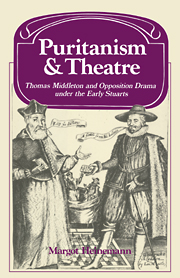Book contents
- Frontmatter
- Contents
- Introductory note
- 1 Time and Place
- 2 Puritanism, Censorship and Opposition to the Theatre
- 3 Middleton as Satirical Journalist
- 4 Early Satirical Comedies
- 5 How Anti-Puritan are Middleton's City Comedies?
- 6 Money and Morals in Middleton's City Comedies
- 7 Middle Years: Tragi-comedy and Moral Comedy
- 8 City Employments
- 9 Hard Times and Hengist, King of Kent
- 10 Political Satire: A Game at Chess
- 11 City Tragedy
- 12 Drama and Opposition, 1619–1640
- 13 From Popular Drama to Leveller Style: a Postscript
- Appendices
- Index
3 - Middleton as Satirical Journalist
Published online by Cambridge University Press: 03 November 2009
- Frontmatter
- Contents
- Introductory note
- 1 Time and Place
- 2 Puritanism, Censorship and Opposition to the Theatre
- 3 Middleton as Satirical Journalist
- 4 Early Satirical Comedies
- 5 How Anti-Puritan are Middleton's City Comedies?
- 6 Money and Morals in Middleton's City Comedies
- 7 Middle Years: Tragi-comedy and Moral Comedy
- 8 City Employments
- 9 Hard Times and Hengist, King of Kent
- 10 Political Satire: A Game at Chess
- 11 City Tragedy
- 12 Drama and Opposition, 1619–1640
- 13 From Popular Drama to Leveller Style: a Postscript
- Appendices
- Index
Summary
Unlike Shakespeare or Marlowe, Thomas Middleton began his career as a writer when the moment of national unity between court and middle class, at its strongest around the time of the Armada, was already passing. Militant Protestantism and Puritanism, so influential on Elizabeth's Privy Council in the days of Leicester and Walsingham, had been increasingly excluded from the political establishment since the mid 1590s. The war with Spain, which had made anti-Catholic satire and polemics acceptable in the drama, ended in 1604. By 1604 James I had disappointed the hopes of the Puritans (and the Commons) by rejecting Puritan demands for Church reform and appointing the anti-Puritan Bancroft as his archbishop.
At the same time royal control and censorship of the drama was being tightened up, as we have seen, and the division of the theatres into fashionable indoor houses and plebeian popular outdoor ones was well under way. All this tended to make the expression of militant anti-Catholic, radical or sceptical viewpoints less easy and less direct than it had been when Marlowe wrote The Massacre at Paris or the anti-Papal clowning in Doctor Faustus. On another side, the festive social harmony which frames Shakespeare's romantic comedies of the 1590s – love and folly at different social levels, clearly separated though in counterpoint, celebrated under the confident leadership of humanist aristocracy and ruler – could no longer be the dominant mode in comic writing in the early years of the seventeenth century.
Thomas Middleton was himself of City origin.
- Type
- Chapter
- Information
- Puritanism and Theatre , pp. 48 - 62Publisher: Cambridge University PressPrint publication year: 1980

